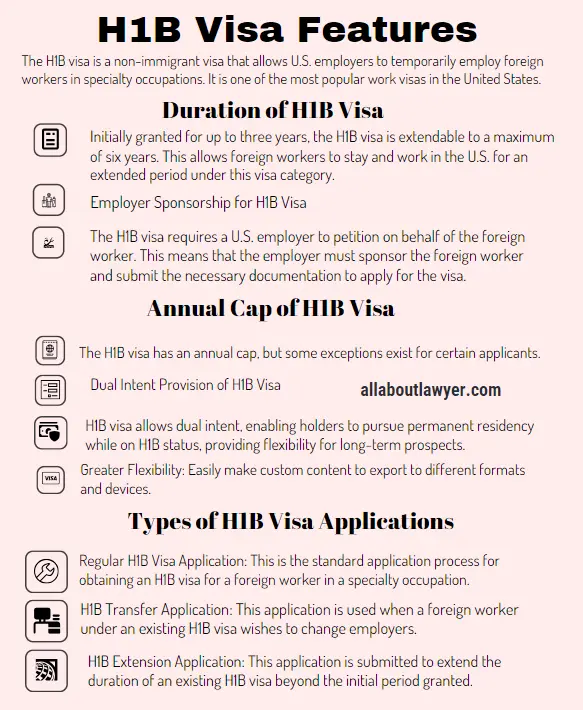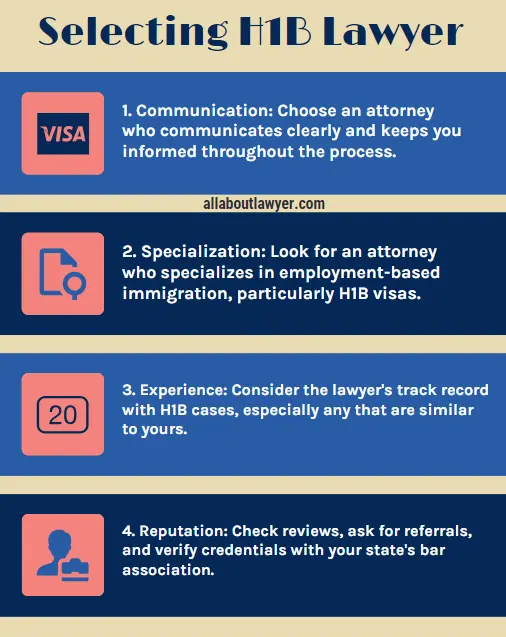Do I Need a Lawyer for H1B Visa?
Every year, over 300,000 petitions are filed for the H1B visa—a highly sought-after U.S. work visa for skilled professionals in specialized fields. Yet, navigating the H1B application process is no small feat. The system is notoriously complex, with a rejection rate that has hovered around 15% in recent years, often due to minor errors or missing information in the application.
Imagine investing time, energy, and resources only to have your H1B application denied because of a simple mistake. For thousands of applicants, the stakes are high—an H1B visa can be a game-changer, offering a path to career advancement and the American dream. But with such high competition and complex requirements, is it wise to handle the process alone?
Table of Contents
Understanding the H1B Visa
Before delving into the necessity of legal representation, it’s crucial to understand what the H1B visa entails. The H1B is a non-immigrant work visa that allows U.S. employers to temporarily employ foreign workers in specialty occupations. These are typically positions that require theoretical and practical application of a body of highly specialized knowledge, such as engineering, mathematics, or technology.
Key features of the H1B visa include:
1. Duration: Initially granted for up to three years, extendable to a maximum of six years
2. Employer sponsorship: Requires a U.S. employer to petition on behalf of the foreign worker
3. Annual cap: Subject to an annual numerical limit, with some exceptions
4. Dual intent: Allows visa holders to pursue permanent residency while on H1B status

The H1B Application Process
The H1B visa application process involves several steps and requires coordination between the employer and the prospective employee. Here’s a brief overview:
1. Labor Condition Application (LCA) filing by the employer
2. H1B petition (Form I-129) submission to USCIS
3. Optional premium processing for faster adjudication
4. If approved, visa stamping at a U.S. consulate abroad (for those outside the U.S.)
Each of these steps involves specific requirements, documentation, and potential pitfalls that can complicate the process.
Reasons to Consider H1B Visa Legal Representation
While it’s possible to go through the H1B application process without an attorney, there are several compelling reasons to consider legal assistance:
1. Complexity of Immigration Law
U.S. immigration law is notoriously complex and subject to frequent changes. An experienced H1B attorney stays up-to-date with the latest regulations, policy memoranda, and adjudication trends, ensuring your application aligns with current requirements.
2. Attention to Detail
The H1B petition requires meticulous preparation of numerous forms and supporting documents. A single error or omission can lead to delays or denials. Immigration counsel for H1B can help ensure all paperwork is completed accurately and comprehensively.
3. Strategizing for Success
An H1B visa lawyer can develop a tailored strategy for your case, particularly important if there are any potential issues such as previous visa denials, complex job descriptions, or employer-employee relationships that may raise questions.
4. Handling Requests for Evidence (RFEs)
If USCIS issues an RFE, having an attorney can be invaluable. They can interpret the request, gather the necessary additional evidence, and craft a compelling response to address USCIS concerns.
5. Handling the H1B Lottery
For cap-subject H1B petitions, understanding the intricacies of the H1B lottery system is crucial. An attorney can provide guidance on timing, strategies to improve selection chances, and alternative options if not selected.
6. Employer Compliance
H1B employers must comply with various Department of Labor (DOL) and USCIS regulations. An H1B compliance attorney can help ensure employers meet their obligations, reducing the risk of violations that could jeopardize current and future petitions.
7. Addressing Unique Situations
Some H1B cases involve complex scenarios such as:
– H1B transfers between employers
– Amendments due to significant changes in employment
– H1B extensions beyond the six-year limit
– Cap-exempt petitions
In these situations, specialized legal knowledge can be particularly beneficial.
8. Peace of Mind
Perhaps one of the most significant benefits of hiring an H1B visa attorney is the peace of mind it provides. Knowing that your case is in the hands of a professional can alleviate much of the stress associated with the visa application process.
When Legal Representation May Be Especially Beneficial To Get H1B Visa
While legal assistance can be helpful in most H1B cases, there are certain situations where it becomes particularly advisable:
1. Previous Visa Denials:
If you’ve had a prior H1B or other visa application denied, an attorney can help address the reasons for the previous denial and strengthen your new application.
2. Complex Job Descriptions:
For positions that don’t neatly fit into traditional “specialty occupations,” legal expertise can be crucial in articulating how the role qualifies for H1B status.
3. Employer-Employee Relationship Issues:
In cases involving third-party placements, consulting positions, or other non-traditional employment arrangements, an attorney can help establish the required employer-employee relationship.
4. Criminal Records:
If you have any criminal history, even minor offenses, it’s advisable to seek legal counsel to understand how this might impact your H1B eligibility.
5. Timing Concerns:
If you’re approaching the end of your current status (e.g., F-1 OPT), an attorney can help navigate timing issues to maintain lawful status.
6. Cap-Exempt Petitions:
For those who may qualify for cap-exempt H1B status, legal guidance can be invaluable in making the case for exemption.
When You Might Not Need a Lawyer
While legal representation offers many benefits, there are situations where you might consider proceeding without an attorney:
1. Straightforward Cases:
If you have a clear-cut specialty occupation and a straightforward employment situation, you might be able to navigate the process on your own.
2. Experienced HR Departments:
Some large companies with experienced HR departments and in-house immigration teams may not require external legal representation for routine H1B filings.
3. Budget Constraints:
If legal fees are a significant concern, you might opt to handle the application yourself, using USCIS resources and guidance.
However, even in these cases, it’s worth considering at least an initial consultation with an H1B visa lawyer to assess your situation and identify any potential issues.
Choosing the Right H1B Attorney
If you decide to seek legal representation, choosing the right attorney is crucial. Consider the following factors:
1. Specialization: Look for an attorney who specializes in employment-based immigration, particularly H1B visas.
2. Experience: Consider the lawyer’s track record with H1B cases, especially any that are similar to yours.
3. Reputation: Check reviews, ask for referrals, and verify credentials with your state’s bar association.
4. Communication: Choose an attorney who communicates clearly and keeps you informed throughout the process.
5. Fees: Understand the fee structure upfront, including what services are covered.

Conclusion
While it’s possible to handle the H1B visa process without legal representation, the complexity of immigration law and the high stakes involved make a strong case for professional assistance. An experienced H1B visa attorney can provide valuable guidance, increase your chances of approval, and offer peace of mind throughout the application process.
Ultimately, the decision to hire a lawyer for your H1B visa application depends on your specific circumstances, the complexity of your case, and your comfort level with navigating U.S. immigration procedures. By weighing the potential benefits against the costs and considering the unique aspects of your situation, you can make an informed decision that best serves your immigration goals.
Related Articles For You:
Can an Immigration Lawyer Help You Get a US Visa?
Do I Need a Lawyer for K1 Visa?
FAQs
How much does an H1B visa lawyer typically cost?
Fees can vary widely depending on the complexity of the case and the attorney’s experience. Typical ranges are from $1,500 to $5,000 or more for standard H1B petitions, with additional costs for premium processing or responding to RFEs.
Can I switch lawyers during the H1B process?
Yes, you can change attorneys at any point during the H1B process. However, it’s generally best to start and finish with the same attorney to ensure consistency in your case strategy.
Will hiring a lawyer guarantee my H1B visa approval?
No attorney can guarantee visa approval, as the final decision rests with USCIS. However, experienced immigration counsel can significantly improve your chances by ensuring your application is properly prepared and presented.
How long does the H1B visa process take with a lawyer?
The timeline can vary, but typically ranges from 2-4 months for standard processing, or 15 calendar days with premium processing. However, a lawyer’s involvement doesn’t necessarily speed up USCIS processing times.
About the Author

Sarah Klein, JD, is a legal writer with experience in immigration and migration law, covering topics like green cards, marriage-based visas, and asylum applications. Through All About Lawyer, she provides straightforward legal insights to help individuals and families navigate complex immigration processes with clarity and confidence.
Read more about Sarah
